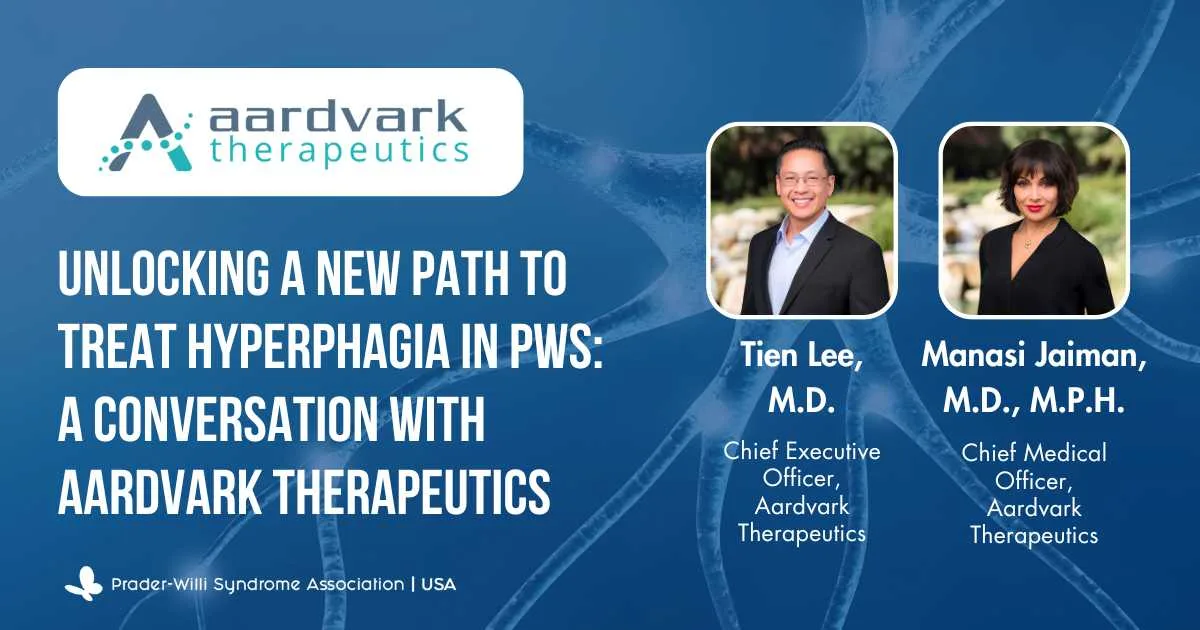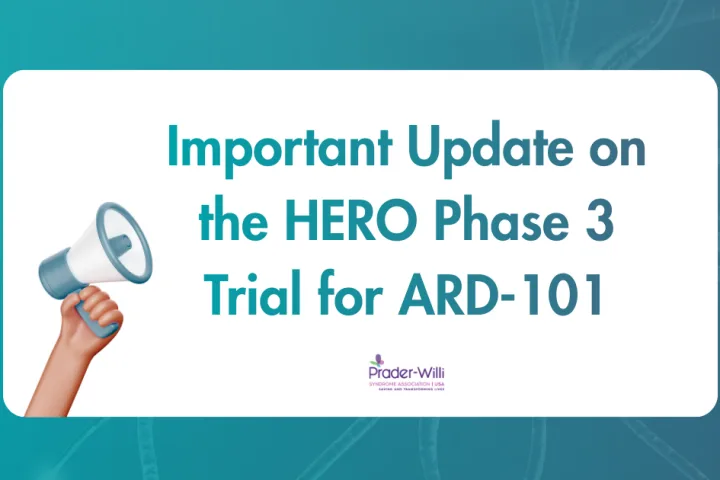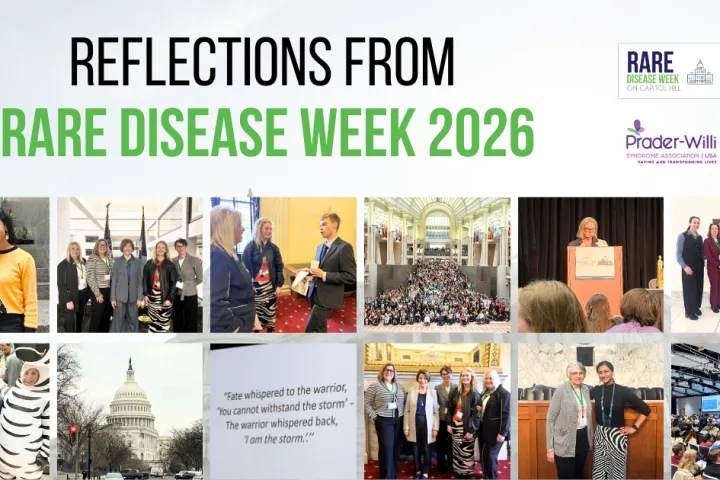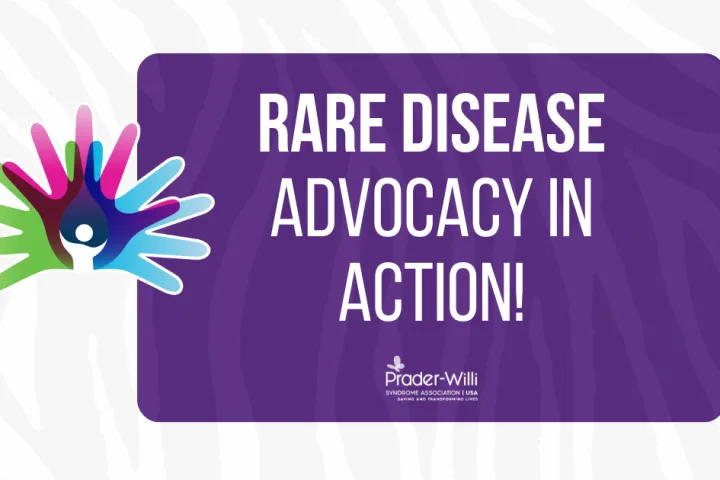Hyperphagia, the relentless hunger that those living with Prader-Willi syndrome (PWS) experience, remains one of the most challenging and life-altering symptoms for individuals and families. But a promising investigational drug called ARD-101 is offering hope.
In our April 29th episode of PWS United, Aardvark Therapeutics’ Dr. Tien Lee, M.D., CEO and Founder, and Dr. Manasi Jaiman, M.D., M.P.H., Chief Medical Officer, joined PWSA | USA to talk about their recently launched Phase 3 clinical trial for ARD-101, a novel, orally administered compound that’s showing potential to reduce food-seeking behavior driving hyperphagia in individuals with PWS.
The Motivation Behind the Mission
Though they come from different backgrounds – Dr. Lee with experience across multiple therapeutic areas, and Dr. Jaiman working as a pediatric endocrinologist in the PWS space – both were ultimately drawn to biotech by a shared commitment to advancing patient care.
“I went to medical school and became a physician because I really wanted to make an impact in patient care and improve the lives of people. That was the driving force behind going into this career. And actually, through serendipity, I became a founder or co-founder of several biotech companies and have been responsible for at least one FDA-approved product. When we started Aardvark, the journey for biotech was a way to leverage an opportunity to reach out and improve the lives of more patients. I thought, if we could help develop new drugs to address conditions where there wasn’t a current treatment, it could multiply impact in patient care as well,” said. Dr. Lee.
Dr. Jaiman echoed that drive, describing how her experience in clinical care led her to the industry.
“I started out as an attending physician because I loved taking care of patients. That one-on-one connection and being able to directly make a difference in someone’s life was very important to me. But over time, I found myself wanting to do more for them, especially when it came down to what I was seeing in terms of limitations for the treatment options they had. I realized that if I could be part of developing better therapies, I could actually bring more back to the patients I was seeing,” said Dr. Jaiman.
Their shared motivation? The people at the center of this work.
A Patient-First Approach
Throughout the conversation, one message was clear: the PWS community is not just a focus of Aardvark’s work, it’s the heart of it.
“As chief medical officer, I still see everything and every decision that we make through the lens of a patient. I’m always asking these questions: How does this impact this person’s life? How will this treat them? Is this something that would make a difference to the patients I’ve cared for so far? And that mindset really influences how all of us on the team think about the clinical trials, how we design them, what endpoints we prioritize, how we think about the access, and even how we communicate the data,” said Dr. Jaiman. “Eventually, and especially here at Aardvark, our work is focused on conditions with significant unmet needs, like Prader-Willi syndrome, and that mission aligns perfectly with my drive to bring better options to patients who don’t have enough of them.”
That sense of urgency is also personal.
“We’re both physicians, but we’re also parents, too. We feel that hardship with the patients and families affected by PWS, and it really drives us every day. We also have a self-imposed feeling of urgency to work every day. We work long hours, and we try to move as quickly and responsibly as we can because we do think we have a potential solution for a lot of these other unaddressed conditions. We want to introduce that to patients and their families as soon as possible,” said Dr. Lee.
About the Phase 3 Clinical Trial
Aardvark Therapeutics’ Phase 3 clinical trial for ARD-101 is designed with a major goal in mind: to center the needs and experiences of individuals with PWS and their caregivers every step of the way.
This global study builds upon the promising results seen in earlier trials, with a focus on confirming both the safety and effectiveness of ARD-101 in reducing hyperphagia. The trial will be open to individuals living with PWS ages 13 and older who live in North America, Europe, and the Asia Pacific. There are currently active sites in the U.S. “First and foremost, all participants and their caregivers are expected to be treated as true partners in this process. Without them, we really couldn’t do any of this,” said Dr. Jaiman.
To reduce barriers to participation, the trial includes a combination of in-person and telehealth visits, with at least half of all appointments conducted virtually. For in-person visits, Aardvark provides comprehensive travel and lodging support.
“What’s really important to us is making the experience as supportive and as manageable as possible, both for the individuals and the caregivers,” said Dr. Jaiman. “So, we’ve implemented as much as possible to really improve that visit day and then to improve how it’s handled throughout the study.”
Additional patient-centric accommodation includes removing fasting requirements for study visits – an intentional decision to avoid exacerbating hunger-related challenges during appointments.
All study locations and details can be found on clinicaltrials.gov by searching “Aardvark Therapeutics.” A dedicated clinical trial website will also be launching soon to help families explore participation and access site-specific information.
About ARD-101
So, what sets ARD-101 apart? Dr. Lee explains that its mechanism targets the gut, not the brain, offering a novel approach to managing hunger safely.
“ARD-101 is a very unique drug. You take it by mouth, and it actually has unique properties in that about 99% of the drug stays in your gut. So, it doesn’t have a very broad systemic exposure. And normally, that’s not a feature of a drug that you think is a good thing, and frankly, neither did we at the beginning until we understood how the drug was working. It actually is activating gut-brain signaling. It works not despite the fact that it stays in your gut, but because it stays in your gut.”
This gut-brain pathway, linked to the hormone Cholecystokinin (CCK), may also influence other symptoms of PWS, like anxiety, lean body mass, and gut transit.
“Our drug is a bitter taste receptor antagonist. It induces this release of CCK, and the CCK is locally released around the gut. That’s important because it restricts the off-target effects of the drug. That, in turn, generates this gut-brain signal, which basically sends a signal to your brain stem to not be hungry anymore. Now, the important part about this is that this gut-brain CCK pathway is actually important for other things as well, and this is one of the reasons why we had such enthusiasm to go after the treatment of Prader-Willi syndrome, because CCK is also associated with decreasing anxiety, improving lean body mass, and also regulating gut transit. So, some of the other important clinical features of Prader-Willi syndrome, we believe, may be tied to a deficiency of this gut-brain signal, which we’re enhancing,” said Dr. Lee.
“We’re really excited about the data we’ve seen so far. We hope that we continue to see that as we progress in our clinical trials to potentially shift the way we manage hyperphagia. It’s not just by reducing these hunger signals but hopefully giving families a little bit more room to breathe. And that’s what’s impactful and the kind of impact that’s really important for us as a company and for the communities that we serve,” said Dr. Jaiman.
Aardvark Therapeutics – Diamond Sponsor for the 2025 International PWS Conference
Aardvark Therapeutics is proud to be the Diamond Sponsor for the 2025 International PWS Conference – United in Hope, hosted by IPWSO, PWSA | USA, and FPWR, June 24-28 in Phoenix, Arizona. They’ll have an exhibitor table at the event, and many members of their team will be attending in person to connect directly with families, caregivers, and professionals.
Share this!






 Perry A. Zirkel has written more than 1,500 publications on various aspects of school law, with an emphasis on legal issues in special education. He writes a regular column for NAESP’s Principal magazine and NASP’s Communiqué newsletter, and he did so previously for Phi Delta Kappan and Teaching Exceptional Children.
Perry A. Zirkel has written more than 1,500 publications on various aspects of school law, with an emphasis on legal issues in special education. He writes a regular column for NAESP’s Principal magazine and NASP’s Communiqué newsletter, and he did so previously for Phi Delta Kappan and Teaching Exceptional Children. Jennifer Bolander has been serving as a Special Education Specialist for PWSA (USA) since October of 2015. She is a graduate of John Carroll University and lives in Ohio with her husband Brad and daughters Kate (17), and Sophia (13) who was born with PWS.
Jennifer Bolander has been serving as a Special Education Specialist for PWSA (USA) since October of 2015. She is a graduate of John Carroll University and lives in Ohio with her husband Brad and daughters Kate (17), and Sophia (13) who was born with PWS. Dr. Amy McTighe is the PWS Program Manager and Inpatient Teacher at the Center for Prader-Willi Syndrome at the Children’s Institute of Pittsburgh. She graduated from Duquesne University receiving her Bachelor’s and Master’s degree in Education with a focus on elementary education, special education, and language arts.
Dr. Amy McTighe is the PWS Program Manager and Inpatient Teacher at the Center for Prader-Willi Syndrome at the Children’s Institute of Pittsburgh. She graduated from Duquesne University receiving her Bachelor’s and Master’s degree in Education with a focus on elementary education, special education, and language arts. Evan has worked with the Prader-Willi Syndrome Association (USA) since 2007 primarily as a Crisis Intervention and Family Support Counselor. Evans works with parents and schools to foster strong collaborative relationships and appropriate educational environments for students with PWS.
Evan has worked with the Prader-Willi Syndrome Association (USA) since 2007 primarily as a Crisis Intervention and Family Support Counselor. Evans works with parents and schools to foster strong collaborative relationships and appropriate educational environments for students with PWS. Staci Zimmerman works for Prader-Willi Syndrome Association of Colorado as an Individualized Education Program (IEP) consultant. Staci collaborates with the PWS multi-disciplinary clinic at the Children’s Hospital in Denver supporting families and school districts around the United States with their child’s Individual Educational Plan.
Staci Zimmerman works for Prader-Willi Syndrome Association of Colorado as an Individualized Education Program (IEP) consultant. Staci collaborates with the PWS multi-disciplinary clinic at the Children’s Hospital in Denver supporting families and school districts around the United States with their child’s Individual Educational Plan. Founded in 2001, SDLC is a non-profit legal services organization dedicated to protecting and advancing the legal rights of people with disabilities throughout the South. It partners with the Southern Poverty Law Center, Protection and Advocacy (P&A) programs, Legal Services Corporations (LSC) and disability organizations on major, systemic disability rights issues involving the Individuals with Disabilities Education Act (IDEA), Americans with Disabilities Act (ADA), and the federal Medicaid Act. Recently in November 2014, Jim retired.
Founded in 2001, SDLC is a non-profit legal services organization dedicated to protecting and advancing the legal rights of people with disabilities throughout the South. It partners with the Southern Poverty Law Center, Protection and Advocacy (P&A) programs, Legal Services Corporations (LSC) and disability organizations on major, systemic disability rights issues involving the Individuals with Disabilities Education Act (IDEA), Americans with Disabilities Act (ADA), and the federal Medicaid Act. Recently in November 2014, Jim retired.